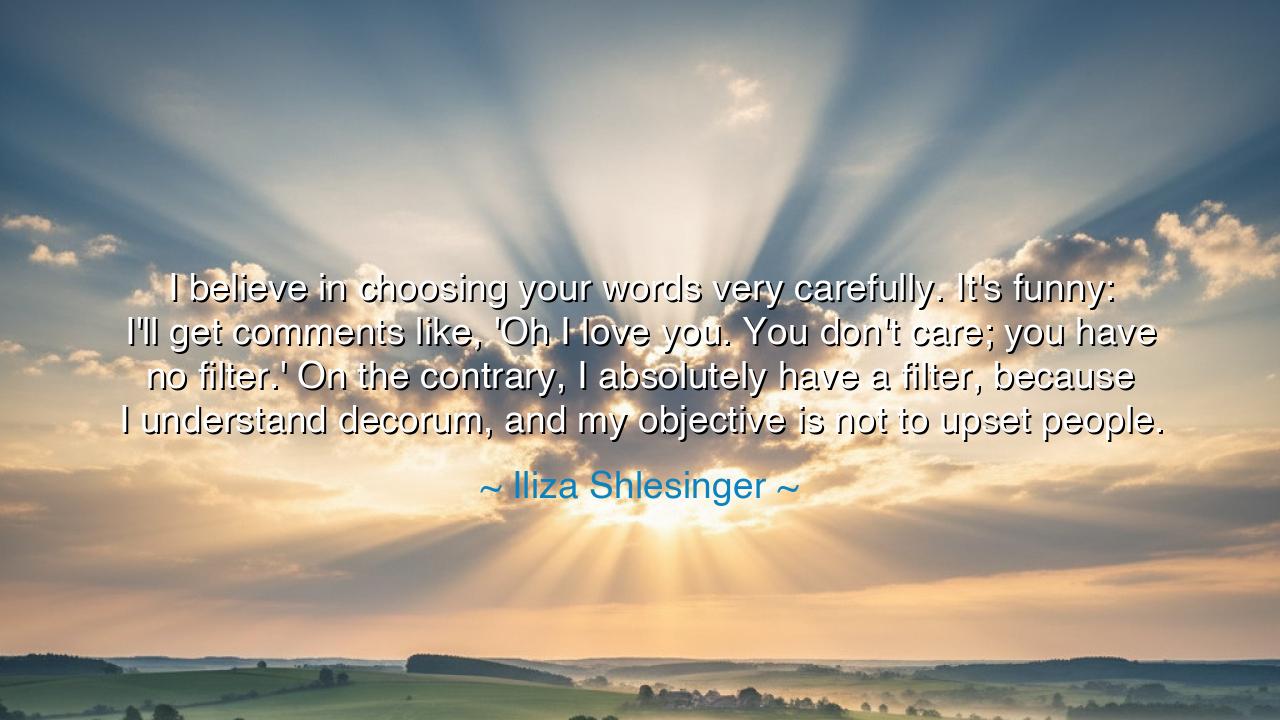
I believe in choosing your words very carefully. It's funny: I'll
I believe in choosing your words very carefully. It's funny: I'll get comments like, 'Oh I love you. You don't care; you have no filter.' On the contrary, I absolutely have a filter, because I understand decorum, and my objective is not to upset people.






In an age when words fly freely and recklessly, Iliza Shlesinger spoke with the calm authority of one who understands their ancient power: “I believe in choosing your words very carefully. It’s funny: I’ll get comments like, ‘Oh, I love you. You don’t care; you have no filter.’ On the contrary, I absolutely have a filter, because I understand decorum, and my objective is not to upset people.” This statement, though uttered by a comedian, carries the gravity of a philosopher. For words, as the ancients knew, are not mere sounds—they are spells, capable of building or burning, of healing or wounding. The one who commands language wisely wields one of the most sacred forces known to humankind.
In this saying, Shlesinger reveals the paradox of true strength in speech. The untrained may think that honesty means speaking without thought, that authenticity requires abandon. But the wise know that freedom without wisdom becomes chaos. A person who says all that comes to mind is like an archer who shoots without aiming; though the arrow may fly fast, it too often harms what it was never meant to strike. Iliza’s filter is not a muzzle—it is the mark of mastery. To have a filter is to know the measure of words, to discern when to speak, how to speak, and when silence itself is the most eloquent response.
In the old days of Athens, it was said that Socrates kept a threefold test for speech: Is it true? Is it kind? Is it necessary? Only when words passed all three gates would he allow them to cross his lips. And so his wisdom endured while countless loud voices faded into dust. Likewise, Shlesinger’s creed carries that same ancient spirit. She does not fear truth, but she honors its delivery. Decorum, as she names it, is not submission to politeness—it is reverence for harmony, the understanding that words shape the world not only for the speaker but for every soul that receives them.
Many confuse brutality with courage and recklessness with honesty. But the warrior who swings his sword wildly destroys friend and foe alike. The artist, the poet, the leader—all who shape the minds of others—must understand restraint as an art. To “have no filter” is not a badge of authenticity, but a sign of immaturity. The truest authenticity is not the rawness of emotion, but the deliberate channeling of it toward good. Just as a river must be guided by its banks lest it flood and destroy, so too must speech be guided by intention and compassion.
Consider the story of Abraham Lincoln, who during the long night of civil war received countless letters of insult and fury. In anger, he would write replies—long, scathing letters—but he never sent them. Instead, he would fold them carefully and mark them “Never Sent.” Later, when his secretary found these letters, Lincoln explained, “I had to write it to ease my mind, but not to wound another.” Therein lies the essence of Iliza’s wisdom: the difference between expression and destruction. To choose one’s words carefully is not cowardice—it is mercy born from understanding.
When Shlesinger says, “My objective is not to upset people,” she speaks as one who understands the greater purpose of communication: connection, not conflict. She does not speak to divide, but to awaken; not to wound, but to reveal truth with grace. True humor, true teaching, true art—they all require empathy. They seek not the applause of provocation, but the resonance of recognition. In this way, her “filter” is not a barrier, but a bridge—a bridge between honesty and kindness, between laughter and wisdom.
Let this teaching then be carried forth to all who hear: Speak deliberately. Do not let your tongue run ahead of your heart. Let your words be weighed as gold, measured for truth and compassion. When anger rises, pause. When you wish to correct, first seek to understand. Speak as though each syllable might shape the soul of another—because it does. The ancients knew this truth: the mouth is the doorway of the spirit, and each word that escapes it either plants life or sows ruin.
Therefore, my friends, learn the discipline of the tongue. Be bold in truth but gentle in delivery. Be honest, but never cruel. Filter not your courage, but your cruelty; not your message, but your malice. For in mastering your words, you master yourself—and in mastering yourself, you bring peace to the world. This is the legacy of those who understand the power of words: to speak with clarity, compassion, and purpose. And as Iliza Shlesinger reminds us, that—above all—is the truest form of strength.






AAdministratorAdministrator
Welcome, honored guests. Please leave a comment, we will respond soon